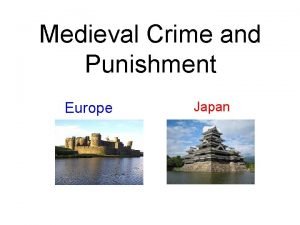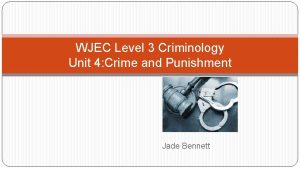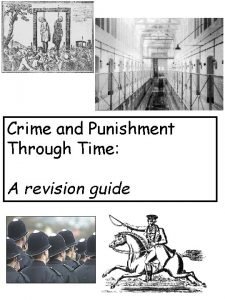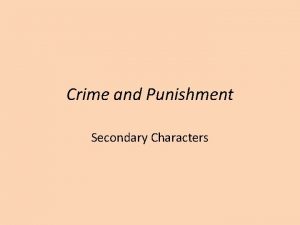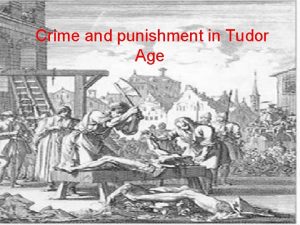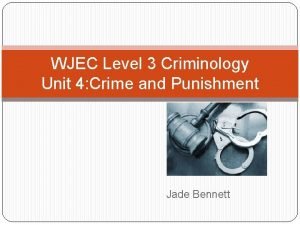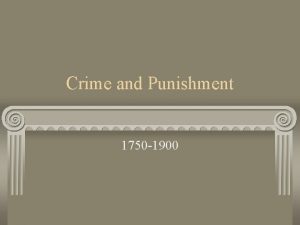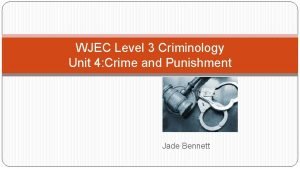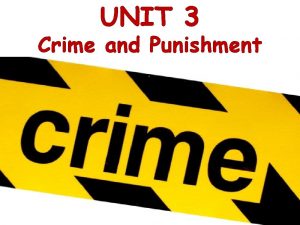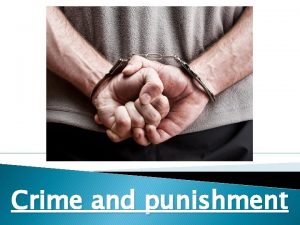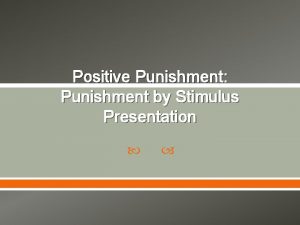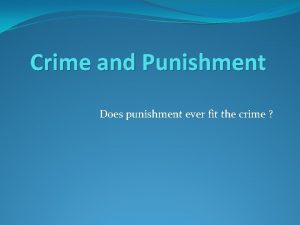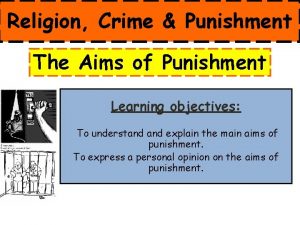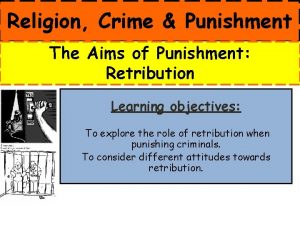Medieval crime and punishment Grade 8 Socials Recap












- Slides: 12

Medieval crime and punishment Grade 8 Socials


Recap: • What were common medieval crimes? • What were common punishments? • Trial by ordeal and trial by combat

Watch: https: //www. youtube. com/watch? v=sn. Vb. GOr. HZa. Y‘French medieval torture chamber’ (Medieval crime and punishment)

• The Medieval law was based around the rules in the bible. The church believed that the Lord was the governor of mankind and that all the rules he set out should be followed. The problem was that they took the laws of the bible and made it more serious than it should be.

• The main law in the middle ages was all the Ten Commandments which are shown in the picture below. Any breach in these laws would have resulted in cruel torture that I’ve mentioned earlier in the previous questions. Other crimes consist of theft, witchcraft, murder, treason, working on Sundays and much more. • The laws in our society today are much similar to the Middle ages but the only difference is that we don’t have all ten commandments as a law compared to the Medieval times when the ten commandments were the core of their justice system.

• If it wasn't for the harsh laws that existed during the Middle Ages, chaos would have prevailed throughout the epoch. Most criminals were subject to a trial which was nothing like the ones we know of today. Each accused person was subject to an ordeal - there were dozens of different ordeals:

• Ordeal by fire: An accused person held a red hot iron bar and walked three paces. The wound was covered and in three days, if the wound healed, the accused was helped by God and therefore he was innocent. On the other hand, if the wound began to fester, God did not help him and he was guilty. • Ordeal by water: In the ordeal by cold water, a barrel was filled with cold water. If the accused sank, he was innocent. The idea was that water being such a pure substance repelled the guilty and sank the innocent.

• Ordeal by combat: Possibly the most common ordeal was by combat. The accused was forced to fight a very strong opponent both with full armor. The idea was that if the accused was innocent, God would grant him miraculous strength and he could easily defeat his opponent. It was common for the fight to last two hours or more since the weapons used could not penetrate the given armor. Therefore, bones were broken and he who had a better physical strength frequently prevailed.

• Ordeal by bread: Usually reserved for the nobility, the ordeal by bread consisted in forcing the accused to eat a full slice of bread without chewing. If the accused choked, he was guilty. If he didn't, God helped him and therefore he was innocent.

• In other regions - or when the crime was very severe, there was actually a trial that analyzed the evidence and decided whether someone was guilty or not, just like we do today. Whether by an ordeal or a formal trial, when the accused was found guilty he could be burned, hanged or tortured. With the latter depending on the crime. It was common for executions to take place in a busy plaza as fear proved to be a fair weapon against criminals. Sometimes, the punishment depended entirely on the crime. Thieves had their hands cut off, spies had their eyes removed, people who illegally hunted in a royal park had their ears cut off, etc.

Crime and Punishment Task- Were these trials fair or unjust? Discuss with a partner
 Medieval crime and punishment facts
Medieval crime and punishment facts Crime and punishment in medieval japan
Crime and punishment in medieval japan Criminology unit 2
Criminology unit 2 Crime and punishment revision guide
Crime and punishment revision guide Who is razumikhin
Who is razumikhin Crime and punishment in tudor times
Crime and punishment in tudor times Wjec unit 4 criminology
Wjec unit 4 criminology Gcse history past papers edexcel
Gcse history past papers edexcel Kahoot crime and punishment
Kahoot crime and punishment Crime and punishment 1750 to 1900
Crime and punishment 1750 to 1900 Effectiveness of social control inside prisons
Effectiveness of social control inside prisons Crime and punishment key words
Crime and punishment key words Crime and punishment topic
Crime and punishment topic

